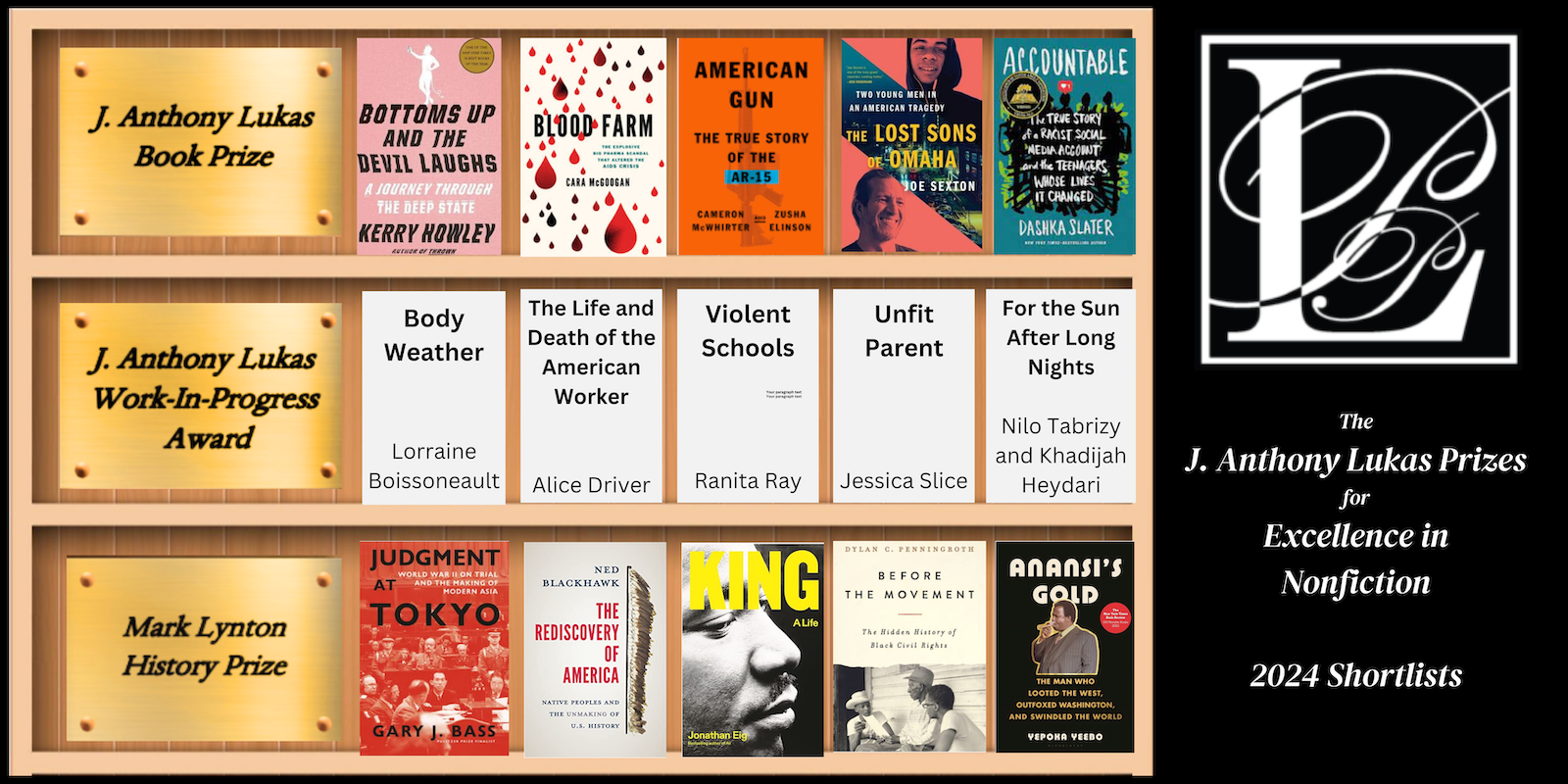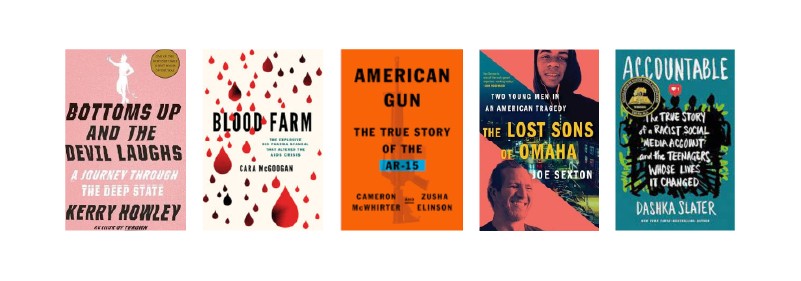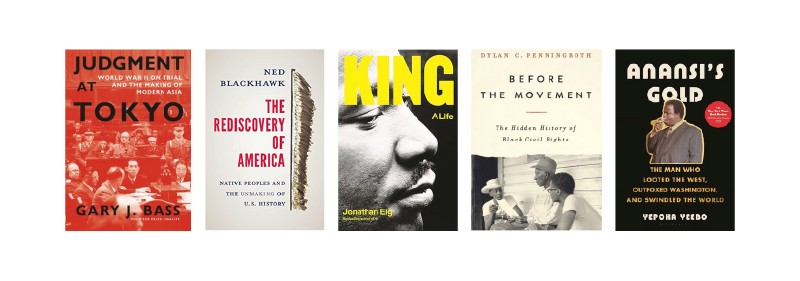Columbia Journalism School Announces the 2024 J. Anthony Lukas Prize Project Shortlists
The winners and finalists of the 2024 Lukas Prizes have been announced, and you can find more details here.
The awards will be presented at a ceremony at Columbia on Tuesday, May 7.

Columbia Journalism School and the Nieman Foundation for Journalism at Harvard University are pleased to announce the 2024 shortlists for the J. Anthony Lukas Work-in-Progress Awards, the J. Anthony Lukas Book Prize, and the Mark Lynton History Prize. The Lukas Prizes, established in 1998, honor the best in American nonfiction writing.
The winners and finalists of the 2024 Lukas Prizes will be announced on Tuesday, March 19. The awards will be presented at a ceremony at Columbia on Tuesday, May 7.
J. Anthony Lukas Work-In-Progress Awards
Two winners each receive $25,000
The J. Anthony Lukas Work-in-Progress Awards are given annually to aid in the completion of significant works of nonfiction on American topics of political or social concern. These awards assist in closing the gap between the time and money an author has and the time and money that finishing a book requires.

Lorraine Boissoneault, Body Weather: Notes on Illness in the Anthropocene (Beacon Press)
Body Weather is a book about living with chronic illness in a world undergoing rapid climate change. By focusing on the author’s personal experience, it illuminates the subtle connections between our bodies and the planet’s meteorology. The narrative examines multiple elements of weather, from temperature to fires and floods, while interspersing stories of autoimmune diseases that affect nearly all body systems and afflict tens of millions of women. Three years into a global pandemic that has killed millions and left millions more newly disabled, Body Weather emphasizes the resourcefulness of the chronically ill, while also highlighting the sexism, racism and ableism that still permeate the medical field. Body Weather tells a story of resilience in the face of suffering, paired with scientific research, history and a keen exploration of the layered chaos of 21st century life.

Alice Driver, The Life and Death of the American Worker: The Immigrants Taking on America’s Largest Meatpacking Company (Astra House)
By shining a light on the lives of the immigrant laborers from marginalized communities who prepare our food, The Life and Death of the American Worker unmasks Tyson Foods, the largest meat-processing company in the U.S. Based in Arkansas, Tyson Foods relies overwhelmingly on immigrants and refugees to do the difficult and dangerous daily labor of processing chicken. During the pandemic, workers from Mexico, Central America, the Marshall Islands, Afghanistan, Vietnam and Myanmar — many of whom only speak their native language — faced working conditions at meatpacking plants that would kill them in greater numbers than any other place in the U.S. except prisons. Laying bare a system of immigration law and labor exploitation that values infinite growth at the expense of human beings, The Life and Death of the American Worker will forever change the conversation on labor conditions and the meaning of work.

Ranita Ray, Violent Schools: Slow Death in the American Classroom (St. Martin’s)
Violent Schools is an unflinching exposé of the American public education system’s indifference toward Black, brown, immigrant, queer and economically marginalized children. Ranita Ray takes readers behind closed classroom doors where routine indifference, verbal abuse, and emotional, psychological and cultural violence from teachers and administrators plague the most vulnerable children. Underpinned by new research in the social sciences, Violent Schools combines Ray’s three-year immersion in one of the nation’s largest school districts with interviews and archival research. While gun violence in schools is a prominent American evil that we are rightly preoccupied with, it overshadows the “slow violence” inside classrooms that preys on the minds, spirits and bodies of many more youths.

Jessica Slice, Unfit Parent: On the Barriers and Brilliance of Raising Kids While Disabled and Chronically Ill (Beacon Press)
Unfit Parent explores the social realities of being a disabled parent (child removal, lack of access, forced sterilization), but also considers what disability culture has to offer to the tangled mess of isolated and consumeristic parenting. In Unfit Parent, Jessica Slice uses disabled parenting as a lens through which to explore creativity, mutual aid, adaptation and acceptance. Slice argues that our obsession with perfectionism in body and mind is a doomed distraction from our collective truth: we are fragile, and we belong to one another.

Nilo Tabrizy and Khadijah Heydari, For the Sun After Long Nights: The Story of Iran’s Women-Led Uprising (Pantheon)
For the Sun After Long Nights is a look at the political upheaval in Iran following the death of Mahsa Amini, also known as Jîna Amini, in the custody of the morality police in September 2022. Co-written by two Iranian journalists, one covering the movement from inside the country and the other from abroad, this book brings the voices of women fighting for their country to the foreground. Blending traditional reportage with cultural memoir, For the Sun After Long Nights is at once a sweeping history of sisterhood and a story of fierce friendship under the most extreme circumstances.
2024 J. Anthony Lukas Work-In-Progress Award Judges: Chris Jackson (chair), Erika Hayasaki, Philip Turner

J. Anthony Lukas Book Prize
Awarding $10,000 to the winner
The J. Anthony Lukas Book Prize recognizes superb examples of nonfiction writing that exemplify the literary grace, commitment to serious research, and original reporting that characterized the distinguished work of the award’s namesake, J. Anthony Lukas. Books must be on a topic of American political or social concern published between January 1 and December 31, 2023.

Kerry Howley, Bottoms Up and the Devil Laughs: A Journey Through the Deep State (Knopf)
A wild, humane and hilarious meditation on post-privacy America, Bottoms Up and the Devil Laughs tells the true story of intelligence specialist Reality Winner, a lone young woman who stuffs a state secret under her skirt and trusts the wrong people to help. After printing five pages of dangerous information that she was never supposed to see, Winner finds herself at the mercy of forces more invasive than she could have possibly imagined. A soap opera set in the “Deep State,” Bottoms Up and the Devil Laughs is a free fall into a world where everything is recorded and nothing is sacred, from a singular writer unafraid to ask essential questions about the strangeness of modern life.

Cara McGoogan, Blood Farm: The Explosive Big Pharma Scandal that Altered the AIDS Crisis (Diversion Books)
By the mid-1980’s, AIDS paranoia was so rampant that a fearful, prejudiced public ignored stories of gay men falling ill. Then an HIV-positive population emerged that included Ken Dixon, Brad Cross and Ryan White, who were infected as early as ten years old. But how? Unbeknownst to doctors and patients, companies like Bayer, Baxter and Armour collected plasma on skid row, in night clubs and in America’s prisons to make Factor VIII, a miracle treatment for hemophilia. Companies knowingly put patients at high risk of HIV, but since miracles are a lucrative business they sold an infected product and played Russian roulette with hemophiliacs’ lives. The results were catastrophic. In Blood Farm, Cara McGoogan exposes corporate greed and negligence that led to one of the biggest, overlooked scandals in history: how a miracle treatment became a deadly poison.

Cameron McWhirter and Zusha Elinson, American Gun: The True Story of the AR-15 (Farrar, Straus & Giroux)
In American Gun, Cameron McWhirter and Zusha Elinson track the AR-15 from inception to ubiquity. How did the same gun represent the essence of freedom to millions of Americans and the essence of evil to millions more? To answer this question, McWhirter and Elinson follow Eugene Stoner, the inventor of the AR-15, as he struggled to win support for his invention. Shunned by gun owners at first, the rifle’s popularity would take off thanks to a renegade band of small-time gun makers. In the 2000s, it would become the weapon of choice for mass shooters, prompting widespread calls for proscription even as the gun industry embraced it as a financial savior. McWhirter and Elinson explore America’s gun culture, revealing the deep appeal of the AR-15, the havoc it wreaks and the politics of reducing its toll.

Joe Sexton, The Lost Sons of Omaha: Two Young Men in an American Tragedy (Scribner)
In The Lost Sons of Omaha, Joe Sexton presents a searing account of two tragic, linked deaths stemming from the 2020 Black Lives Matter protests. In unpacking the twisted chronicle, Sexton sheds light on some of the most pressing issues facing America today, including our country’s broken criminal justice system, the failure to care for the men and women who fight our wars, the dangerous spread of misinformation, particularly on social media, and the urgent need to band together in the collective pursuit of truth, fairness and healing.

Dashka Slater, Accountable: The True Story of a Racist Social Media Account and the Teenagers Whose Lives It Changed (Farrar, Straus & Giroux)
Accountable, the winner of the YALSA Award for Excellence in Nonfiction, recounts the story of a racist social media account that changes everything for a group of teens. When a high school student started a private Instagram account that used racist and sexist memes to make his friends laugh, he thought of it as “edgy” humor. Over time, the edge got sharper. Then other kids found out about the account. Soon, everyone knew. Ultimately no one in the town of Albany, California, was safe from the repercussions of the account’s discovery. In the end, no one was laughing. And everyone was left asking: Where does accountability end for online speech that harms, and what does accountability even mean?
2024 J. Anthony Lukas Book Prize Judges: Masha Gessen (chair), Kurt Andersen, Suzy Hansen, Linda Villarosa

Mark Lynton History Prize
Awarding $10,000 to the winner
The Mark Lynton History Prize is awarded to the book-length work of narrative history, on any subject, that best combines intellectual distinction with felicity of expression. Books must have been published between January 1 and December 31, 2023.

Gary J. Bass, Judgment at Tokyo: World War II on Trial and the Making of Modern Asia (Knopf)
Judgment at Tokyo is a landmark history of the trial of Japan’s leaders as war criminals — the overlooked Asian counterpart to Nuremberg. After World War II, the victorious Allies insisted on putting Japan’s wartime leaders on trial for aggression at Pearl Harbor and shocking atrocities across Asia. The Allies intended for the tribunal to build a more peaceful world under international law and American hegemony. On trial, Japanese leaders retorted that they had fought to liberate Asia from Western imperialism and that the court was victors’ justice. For more than two years, lawyers sparred before clashing Chinese, Indian, Philippine, American, and Soviet judges. Rather than clarity, the trial brought dissension and division that cause international discord between China, Japan and Korea to this day. The product of a decade of research and writing, Judgment at Tokyo is a magisterial history of the years that shaped postwar Asia.

Ned Blackhawk, The Rediscovery of America: Native Peoples and the Unmaking of U.S. History (Yale University Press)
The most enduring feature of U.S. history has been the presence of Native Americans. Yet most American histories give scant attention to how Native Americans have shaped American history, even though Indigenous history has grown into one of the 21st century’s most dynamic fields of historical inquiry. The Rediscovery of America retells the history of America from the first decades of Spanish colonial exploration to the rise of Native American self-determination in the late 20th century, showing that Native history remains essential to understanding the evolution of modern America. Historian Ned Blackhawk interweaves Native and non-Native histories to expose the centrality of Native Americans to every century of North American historical development: European colonization in the 1600s was never a predetermined success; Native nations centrally shaped England’s crisis of empire; the American Revolution’s first shots occurred over Indian affairs in the interior; and the federal government built much of its administrative capacities in the 19th century through treaty-making and related Indian policies. Accessible and up-to-date, The Rediscovery of America is one of the few attempts to synthesize over five centuries of Native American history.

Jonathan Eig, King: A Life (Farrar, Straus & Giroux)
Vividly written and exhaustively researched, King: A Life is the first major biography in decades of the civil rights icon Martin Luther King, Jr. In this revelatory new portrait of the preacher and activist who shook the world, Eig gives us an intimate view of the courageous and often emotionally troubled human being who demanded peaceful protest for his movement but was rarely at peace with himself. As he follows MLK from the classroom to the pulpit to the streets of Birmingham, Selma and Memphis, Eig dramatically re-creates the journey of a man who recast American race relations and became our only modern-day founding father — as well as the nation’s most mourned martyr. King: A Life mixes revelatory new research with accessible storytelling to offer an MLK for our times: a deep thinker, a brilliant strategist and a committed radical who led one of history’s greatest movements, and whose demands for racial and economic justice remain as urgent today as they were in his lifetime.

Dylan C. Penningroth, Before the Movement: The Hidden History of Black Civil Rights (Liveright/W.W. Norton)
In Before the Movement, historian Dylan C. Penningroth revises the conventional story of the civil rights movement. Drawing on long-forgotten sources found in the basements of courthouses across the nation, Penningroth reveals that African Americans, far from being ignorant about law until the middle of the 20th century, used it going as far back as even the era of slavery. They dealt constantly with the laws of property, contract, inheritance, marriage and divorce, and more. By exercising these “rights of everyday use,” Penningroth demonstrates, they made Black rights seem unremarkable. In innumerable subtle ways, they helped shape the law itself — the laws all of us live under today. Penningroth’s narrative challenges accepted understandings of Black history framed by relations with white people and puts Black people at the center of the story. Before the Movement is an account of Black legal lives that looks beyond the Constitution and the criminal justice system to recover a rich, broader vision of Black life — a vision allied with, yet distinct from, “the freedom struggle.”

Yepoka Yeebo, Anansi’s Gold: The Man Who Looted the West, Outfoxed Washington, and Swindled the World (Bloomsbury)
Anansi’s Gold tells the never-before-told story of how an audacious Ghanaian con artist pulled off one of the 20th century’s longest-running and most spectacular frauds. After Ghana won its independence from Britain in 1957, a CIA-funded military junta ousted the new nation’s inspiring president, Kwame Nkrumah, then falsely accused him of hiding the country’s gold overseas. Into this big lie stepped one of history’s most charismatic scammers, a con man to rival the trickster god Anansi. Born into poverty in Ghana and trained in the United States, John Ackah Blay-Miezah declared himself custodian of an alleged Nkrumah trust fund worth billions. Through the 1970s and ’80s, he and his accomplices scammed hundreds of millions of dollars out of thousands of believers. In Anansi’s Gold, Yepoka Yeebo chases Blay-Miezah’s ever-wilder trail and discovers, at long last, what really happened to Ghana’s missing wealth, unfolding a riveting account of Cold War entanglements, international finance and postcolonial betrayal.
2024 Mark Lynton History Prize Judges: William G. Thomas III (chair), Marica Chatelain, Andrés Reséndez, Elizabeth Taylor